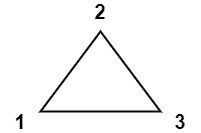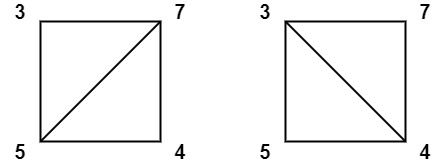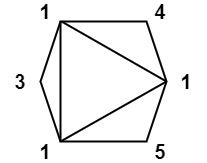Welcome to Subscribe On Youtube
1039. Minimum Score Triangulation of Polygon
Description
You have a convex n-sided polygon where each vertex has an integer value. You are given an integer array values where values[i] is the value of the ith vertex (i.e., clockwise order).
You will triangulate the polygon into n - 2 triangles. For each triangle, the value of that triangle is the product of the values of its vertices, and the total score of the triangulation is the sum of these values over all n - 2 triangles in the triangulation.
Return the smallest possible total score that you can achieve with some triangulation of the polygon.
Example 1:

Input: values = [1,2,3] Output: 6 Explanation: The polygon is already triangulated, and the score of the only triangle is 6.
Example 2:

Input: values = [3,7,4,5] Output: 144 Explanation: There are two triangulations, with possible scores: 3*7*5 + 4*5*7 = 245, or 3*4*5 + 3*4*7 = 144. The minimum score is 144.
Example 3:

Input: values = [1,3,1,4,1,5] Output: 13 Explanation: The minimum score triangulation has score 1*1*3 + 1*1*4 + 1*1*5 + 1*1*1 = 13.
Constraints:
n == values.length3 <= n <= 501 <= values[i] <= 100
Solutions
-
class Solution { private int n; private int[] values; private Integer[][] f; public int minScoreTriangulation(int[] values) { n = values.length; this.values = values; f = new Integer[n][n]; return dfs(0, n - 1); } private int dfs(int i, int j) { if (i + 1 == j) { return 0; } if (f[i][j] != null) { return f[i][j]; } int ans = 1 << 30; for (int k = i + 1; k < j; ++k) { ans = Math.min(ans, dfs(i, k) + dfs(k, j) + values[i] * values[k] * values[j]); } return f[i][j] = ans; } } -
class Solution { public: int minScoreTriangulation(vector<int>& values) { int n = values.size(); int f[n][n]; memset(f, 0, sizeof(f)); function<int(int, int)> dfs = [&](int i, int j) -> int { if (i + 1 == j) { return 0; } if (f[i][j]) { return f[i][j]; } int ans = 1 << 30; for (int k = i + 1; k < j; ++k) { ans = min(ans, dfs(i, k) + dfs(k, j) + values[i] * values[k] * values[j]); } return f[i][j] = ans; }; return dfs(0, n - 1); } }; -
class Solution: def minScoreTriangulation(self, values: List[int]) -> int: @cache def dfs(i: int, j: int) -> int: if i + 1 == j: return 0 return min( dfs(i, k) + dfs(k, j) + values[i] * values[k] * values[j] for k in range(i + 1, j) ) return dfs(0, len(values) - 1) -
func minScoreTriangulation(values []int) int { n := len(values) f := [50][50]int{} var dfs func(int, int) int dfs = func(i, j int) int { if i+1 == j { return 0 } if f[i][j] != 0 { return f[i][j] } f[i][j] = 1 << 30 for k := i + 1; k < j; k++ { f[i][j] = min(f[i][j], dfs(i, k)+dfs(k, j)+values[i]*values[k]*values[j]) } return f[i][j] } return dfs(0, n-1) } -
function minScoreTriangulation(values: number[]): number { const n = values.length; const f: number[][] = Array.from({ length: n }, () => Array.from({ length: n }, () => 0)); for (let l = 3; l <= n; ++l) { for (let i = 0; i + l - 1 < n; ++i) { const j = i + l - 1; f[i][j] = 1 << 30; for (let k = i + 1; k < j; ++k) { f[i][j] = Math.min(f[i][j], f[i][k] + f[k][j] + values[i] * values[k] * values[j]); } } } return f[0][n - 1]; }